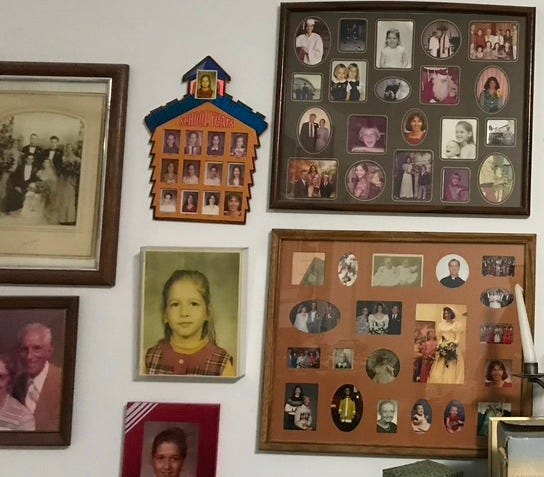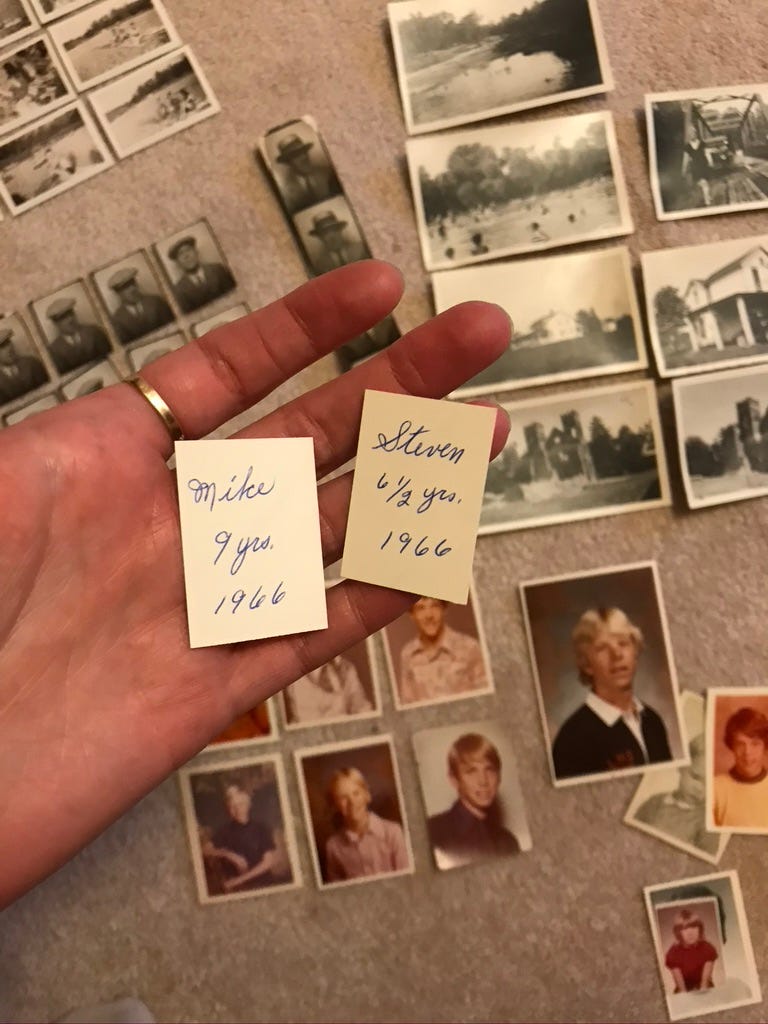I took my grandma out for lunch on one of my days off work. Over our salads, she told me the stories of her father’s last days. A story of waiting outside his hospital room because he was ready to go and did not want her getting in the way of it. Of how, a few months before, she took him to the landscape where he lived most of his life and then to the cemetery where his parents and their parents were buried. He’s someone I’ve never met, but I watch these scenes in my head like a movie.
Last month, my uncle told us that his grandfather invented a very specific technology used in turning on furnaces, and his grandmother was a bridge master who would travel to compete and teach.
It has only been a month since he told us this, but I’m already doubting my memory. Was it bridge or another card game? It was turning furnaces on, right? And come to think of it: how long before his death did my grandma take her father on the trip, and what was the exact west Texas landscape she mentioned?
My uncle only told us this because my partner asked the table about their grandparents. New to the family, it makes sense that he would be the one to ask, but I am learning many things for the first time as well.
I realize that, in this moment, I can only recall the first names of a few of my great-grandparents. These are people only one generation from my knowing, who raised people who loved and molded me. Whose lives trickle down into my own, but exist in my mind only through a few facts and stories.
There was the scary Texan matriarch called Granny Mama. But the generations blur in my mind, and I decide she must have been my grandpa’s grandmother.
The middle school principal who was the father of six boys.
The man who was always told that the woman who raised him was his mother, until he saw his birth certificate as he became an adult.
The German immigrants who ran a bakery.
The West Texas farmers.
The playful carpet layer who loved practical jokes.
And maybe it’s because I recently started reading fiction again, but I see how all of these people could be written into entire characters with fascinating worlds, relationships, and plots.
What became of the inventor and the famed card player? What hard decisions did the bakers have to make? What happened to make Granny Mama so scary? Who were her parents? What was the world like to her? What was she scared of?
Of course, these people are already entire characters of their own. But my knowledge of them exists only in a few facts, intriguing and solitary.
What we know about so many people are truly just fragments. Even the people we see every day, compared to the world within — just fragments.
This morning, my grandmother followed up from our lunch conversation to tell me another story about her sister who died in her early 20s.
The telling of these stories feels like looking through an old jewelry box. Taking out a piece, letting me try it on, and then carefully tucking it back where it came from. You might say: This necklace belonged to my mother. But I do not know on which occasions it was worn. I do not know if it was a gift or something she bought herself. I do not know how she felt when she wore it.
I am grateful my grandmother shares these with me — that she trusts me with them.
I try to think of why physics says a ball bounces less each time it hits the ground. My memory disappoints me again, so I look it up. With each contact with the ground, its initial energy is converted into other types of energy.
I imagine our stories are like that. As they are passed along, details change or disappear through the years and the tellings. Once, these stories were lived, with all of the original energy of the first bounce hitting the ground. These stories had feel, taste, sound, and first-hand emotion. Then, over time, they became rougher outlines, quick pencil sketches, anecdotes, explanations for why people are the way they are, something to laugh at, energy that has been converted over time.
Except for the canonized, most memories will eventually come to rest. New stories will be passed down, and new ones after that.
These are some of the stories I tell others:
I have a grandfather who raised hamsters and sold them for $1 each to raise $50 to buy a typewriter for high school. Years later, he tried to throw it away, but the garbage collector wouldn’t let him. For my 16th birthday, I got the typewriter repaired so I could use it.
Just last week, I heard a story that my other grandfather was offered a gift of a boat, which he turned down because he knew it would be too much of a temptation for him not to go to church. I feel proud of his commitment to his values.
I have a grandmother who saw Elvis perform before he got famous — an important distinction if you ask her.
And a grandmother who always wanted to take tap lessons but didn’t have the money growing up, so in her 50s, she started taking tap. She tapped until she was 80.
Maybe it’s just because I’m still pretty young, but it does not bother me to think that, in the future, maybe only a handful of stories will be told about me. I’m okay with letting others decide what stories they want to tell. We can’t choose what about our lives will resonate with others, good or bad, only how we live it. We don’t get to choose what will be forgotten or what will become a part of someone’s own mythology, canon, and understanding of the world. Heck, we can’t even fully choose what we remember ourselves.
I try, though — I am trying — to remember as best I can. Not just facts, but feelings — the impact of a story’s first bounce. I try to remember:
A grandmother who made me feel like I was the only person in the room, who would humor me with silly dances and fake languages for hours and hours.
A grandfather who had a smell I can’t describe, but flannel, cough drops, and book pages get sort of close.
A grandfather who never speaks badly about others, and it made me desperate to hear his opinions.
A grandmother who has written me notes and texts all my life, more than I can remember, but all of which I appreciate. She texted me last week: “Love you so much from the day you were born.”










Elizabeth, you have a gift with words. Thank you for sharing.
I am off to a family reunion tomorrow. You have put a brighter flame under my curiosity. I look forward to absorbing stories told and times shared.
I was just talking to my dad today and learned my great grandfather was a 1/4 Native American. Probably Sioux but we don’t know for sure. There are some stories that are told that seem like straight from a tv script. I’ll text you one later this week if I remember.